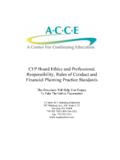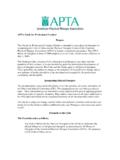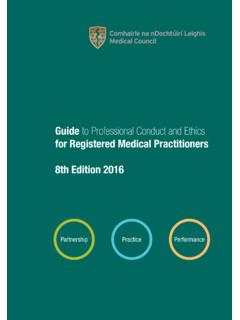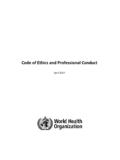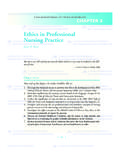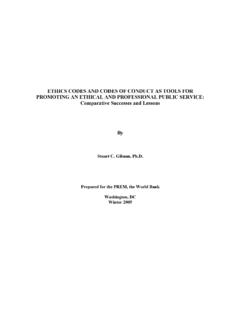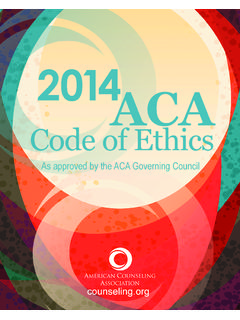Transcription of Ethics Considerations for the Project Manager in ...
1 2007, Jeffrey H. Schweriner Originally published as a part of 2007 PMI Global Congress Proceedings Budapest, Hungary 1 Ethics Considerations for the Project Manager in professional Services Jeffrey H. Schweriner, Project Manager , The Project Management Institute Introduction Project managers are typically judged on how well they complete a Project on time, on budget, and within scope. But when Project decisions are driven by those who are judged on different criteria such as driving sales or hitting a revenue goal those decisions can be in conflict with a trained Project Manager s better judgment. As Project management becomes integral to newer and varying industries, Project managers can find themselves in situations where ethical issues may not have previously arose. Many professional services companies like information technology (IT) consulting, interactive agencies, and web development shops may not be as operationally mature as other consulting firms that have been in business longer.
2 These small to mid-size firms are often very client-relationship-driven, and an account Manager or salesperson can be a strong voice in operational decisions. Firms that do not have a strong ethical voice may be more likely to be involved in questionable costing practices. And in firms where Project management is weak, the Project Manager can be pressured to engage in behaviour that is in conflict with ethical standards, and more in line with the various motivations of co-workers. Furthermore, clients may be na ve about what is involved in their projects when new or very specialized services are involved. Where is the line between unethical Project management and just good business ? When is withholding information unethical? And when is being a good partner a betrayal of trust? Recently, I concluded a ten year period working in IT professional consulting services and interactive agencies. Reflecting on the aspects of these experiences, I felt compelled to have a discussion on ethical issues in the context of this industry.
3 The goal of this paper is not to explore definitions of Ethics , as much has been written on this topic. Rather, this paper discusses what ethical conflicts may present themselves to the Project Manager in professional services. The appropriate disclosure with regards to costing is explored. This paper also suggests how a Project Manager can take the higher ethical road and still feel secure in the job. For Project managers in a customer role, risk mitigation techniques are recommended that can help avoid conflicts altogether. Ethical Standards in Project Management Background To examine ethical issues in professional services, it is necessary to provide some background on the topic. When the word Ethics is mentioned, one first tends to think of traditional forms of improprieties, such as bribery, falsifying costs, or blatant fraud. However, ethical concerns take other forms, and there are subtleties to many of them. In a climate of high-profile cases like the Enron or WorldCom scandals, Ethics continues to be infused into business conversations.
4 The topic of Ethics as it relates to Project management has been building momentum in this climate. Today, Ethics and guidelines are discussed more at meetings and in Project management classes. When ethical issues exist in construction or industries where health and safety is a concern, people could become hurt or even die. In some countries, there are even movements to create additional public accountability by licensing Project managers where public safety is involved. The ethical issues that appear in professional services do not deal with life-threatening quality issues most issues centre on money, information sharing, and taking advantage of a customer s faith or naivety, and that is what will be explored below. PMI s Approach to Ethics The Project Management Institute (PMI ) is a professional organization dedicated to the development and promotion of Project management. PMI believes it is vital that its members conduct their work in an ethical manner in order to earn and maintain the confidence of team members, colleagues, employees, employers, customers and 2007, Jeffrey H.
5 Schweriner Originally published as a part of 2007 PMI Global Congress Proceedings Budapest, Hungary 2clients, the public, and the global community. PMI believes that people who practice Project management should do so with a high level of moral character. PMI also believes that the words Ethics and professional should be synonymous and that Ethics should be aspirational and enforceable. One of PMI s visions is to create a sense of accountability for the profession s future. (Bouley, 2007). PMI Membership Standards of Conduct In the past, PMI had separate Ethics standards for members and for PMI credentialed individuals. Until just recently, PMI had a separate Member Code of Ethics , describing the obligations and expectations associated with PMI membership. And, specific sections spoke to ethical behaviour pertinent to professional services. Under professional Obligations Relationship with Customers, Clients, and Employers, the code stated: PMI Members will provide customers, clients, and employers with fair, honest, complete accurate information concerning (a) their qualifications; (b) their professional services; and (c) the preparation of estimates concerning costs, services, and expected results.
6 (PMI, 2007, p. 2) PMI Credential Standards of Conduct PMI requires that a Project Management professional (PMP ) and a Certified Associate of Project Management (CAPM ) agree to a Code of professional Conduct upon receiving their credential. Certainly, when a PM practitioner obtains a credential there is an even greater feeling of responsibility to uphold professionalism and practice ethically. And, the Code of professional Conduct naturally spoke to Ethics even more strongly than the Member Code, mentioning Ethics several times. PMI s New Code of Ethics and professional Conduct PMI has recently revised and combined the above mentioned codes into one code, The Code of Ethics and professional Conduct, which applies to all PMI members, non-members who hold a PMI certification, non-members who apply for PMI certification and non-members who serve PMI in a volunteer capacity (PMI). Stakeholders who contributed input to develop this Code concluded that having multiple codes was undesirable and that everyone should be held to one high standard.
7 (PMI, 2007 p 1) The Ethics Standards Development Committee (ESDC) facilitated the drafting of the new code based on extensive input from the global Project management committee. The ESDC believes that the actions of an individual practitioner shape the reputation of the entire wanted to set a high standard that will instill confidence in the public with regards to the Project management profession and equip practitioners to make wise decisions under sometimes difficult circumstances. (Bouley, 2007, p 3) When an Organization s Ethics Conflict with those of the Project Manager Possible Root Causes of Ethical Issues in professional Services professional services are very often driven by relationships many team members working very hard to keep their clients happy. Normally, account directors, account managers, and account executives are tasked with maintaining the business relationship, focusing on strategic goals, and seeking out new business opportunities.
8 Project managers can find themselves in a situation where they are working closely with, and pressured into strategically aligning with, co-workers with different objectives like revenue generation. If you work in a matrix organization that has a power balance, account management and sales may have as much influence if not more than the Project Manager . In a weak matrix environment where the Project Manager has reduced power, this can present additional difficulties. Effect on the Individual and the Profession Ethical issues within an organization can have a negative effect on any employee s morale and can contribute to general tension. The affect on a Project Manager will undoubtedly be more pronounced, as the Project Manager is charged with controlling budget and quality. When Project managers behave ethically, it has its own rewards, 2007, Jeffrey H. Schweriner Originally published as a part of 2007 PMI Global Congress Proceedings Budapest, Hungary 3including allowing the Project Manager to sleep better at night (Robb, 1996).
9 Ethical issues also affect more than individuals if a customer feels cheated after a Project , it cheapens the profession, making the gain of trust that much harder for the next Project Manager working with that customer. Situations Where Ethical Concerns Exist The Fog of Large Time and Materials Projects In the world of professional services, once a client relationship has been established, there is a strong desire on behalf of the vendor to move away from many smaller projects, and seek out fewer projects with larger contract values. This is because smaller projects ($5,000 to $100,000) tend to have lower profit margins than larger projects. There is also more administrative work, and larger projects require greater sales efforts. professional services firms like the idea of a larger Project that will keep many people in their office very busy for a longer time. And of course, with larger projects the sales force can make their numbers with one large concentrated effort, rather than achieving their goals 25K at a time.
10 However, it can be argued that larger projects do not control staff as well as smaller projects do. Once that large amount is on the books, and the financial goals for that client are essentially met, there is less discipline than is required for a small Project with a tight budget. I have often asked how a client can simply agree to a huge lump some amount. Strangely, some clients with large budgets are comforted by the fact that an expensive first-class agency was hired. In addition, some customers like the idea of one large Project and budget. It means less paper work for them, and there is less thought about how to spend that budget for the year. The murkiness of large time and materials projects is best illustrated with an example. A firm that I had worked for was involved in a Project , Project A, which went over budget and cost the firm a significant amount of money. Around the same time, the firm sold to the same client a program made up of seven projects, Program X.

